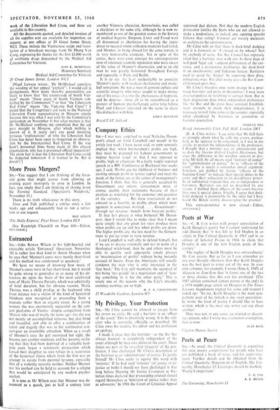My Privilege, Your Protection
SIR,—Mr Cline cannot be allowed to escape from his errors so airily. He said a barrister is an 'officer of the court.' This is absolutely wrong. It is the soli- citor who is, correctly, officially so described. Mr Cline owes his readers, his editor and his profession an apology.
I made it clear that the barrister—as the Bar has always boasted—is completely independent of the court although he may owe duties to the court. These duties are part of the so-called 'etiquette' of the pro- fession. I also challenged Mr Cline's description of the barrister as an 'administrator' of justice. To justify himself Mr Cline seeks to equate this word with 'minister.' If he had used 'minister' (of justice or in- justice or both) I should not have challenged it. For long before Denning Mr Justice Crompton in Vic- torian times declared that prosecuting counsel should regard themselves as 'ministers of justice rather than as advocates.' In 1916 the Court of Criminal Appeal approved that dictum. Not that the modern English prosecutor (unlike the Scots who are not allowed to make a tendentious, or indeed, any, opening speech) follows that ruling! Counsel are merely assistants or acolytes to the administrators.
Mr Cline tells us that 'there is dock-brief dodging and it is frowned on ' Frowned on by whom? Not by anybody of sense. The Bat Council has expressly ruled that a barrister may walk out. In these days of well-paid 'legal aid.' rampant debasement of the cur- rency, and a prosperous proletariat, the dock-brief in an anachronistic and ludicrous lunacy. Barristers used to avoid the 'docker' by removing their dirty, unhygienic wigs. But after many years the Bar Coun- cil frowned upon that.
Mr Cline's blunders may seem strange in a prac- tising barrister and pc:ty in themselves: I may seem over-scrupulous in troubling to correct them. But in these degenerate days when independent professions like the Bar and the press have constant Establish- ment attempts to erode their independence, it is necessary to nail false coins to the counter, especially when circulated by barristers or journalists or barrister-journalists.
CHARLES GILL
Royal Automobile Club, Pull Mall. London SW 1
[R. A. Cline writes: 'I am sorry that Mr Gill feels so strongly about what he calls my errors, particu- larly as he appears to be concerned, as I was in my article, to protect the independence of the profession. l thought that a minister was an administrator and so does the Shorter Oxford English Dictionary, but since the difference in the wording appears to pro- voke Mr Gill, by all means read "minister of justice" for "administrator of justice." As to "officers of the court," this is surely a somewhat unreal argument. Solicitors are dubbed by statute "officers of the Supreme Court" to indicate their special duties to the court and their subjection to its disciplinary power. In all substantial respects they are as independent as barristers. Barristers are not so described by any statute. I dubbed them officers of the court because they owe it special duties. Finally. I agree that dock- brief dodging is permissible by the rules but I have heard the Bench sternly discouraging the practice.'
This correspondence is now closed.—Editor, sPECTATOR.]














































 Previous page
Previous page